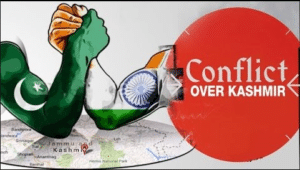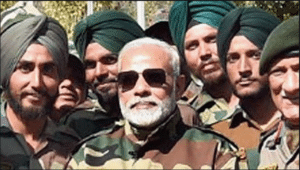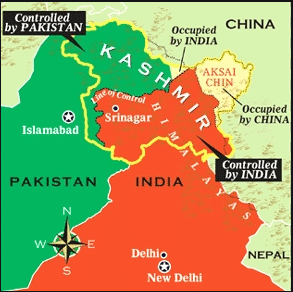India and Pakistan have been fighting for territorial control of Kashmir ever since the British partitioned India in 1947. Indeed, not since the Peloponnesian Wars has one nation, divided against itself, fought so many wars to so little avail.
 To be fair, each side would insist that it has only ever engaged in cross-border skirmishes to keep the other side in check. Nothing gives credence to this insistence quite like the Damoclean sword of Mutually Assured Destruction (MAD), which hangs over India and Pakistan as nuclear powers.
To be fair, each side would insist that it has only ever engaged in cross-border skirmishes to keep the other side in check. Nothing gives credence to this insistence quite like the Damoclean sword of Mutually Assured Destruction (MAD), which hangs over India and Pakistan as nuclear powers.
This explains why, despite blaming Pakistan for orchestrating the 9/11-style attacks in Mumbai, India retaliated only with rhetorical fusillades. Here in part is how I commented back then in “Terror in Mumbai,” December 8, 2008:
____________________
Despite India’s incendiary accusations and Pakistan’s determined denials, I am confident that this tragedy will not trigger open warfare between these two countries. India and Pakistan will continue to endure a Damoclean coexistence for the same reason the United States and Russia do: No matter how heated the political rhetoric or how deadly the military skirmish, the possession of nuclear weapons deters them from escalating any confrontation to the point of triggering their Mutually Assured Destruction (MAD).
____________________
 Accordingly, India can be forgiven for expecting Pakistan to deliver nothing more than rhetorical fusillades in retaliation for this decisive political strike:
Accordingly, India can be forgiven for expecting Pakistan to deliver nothing more than rhetorical fusillades in retaliation for this decisive political strike:
The Indian government’s decision to revoke the semiautonomous status of Kashmir, accompanied by a huge security clampdown, is dangerous and wrong. …
The government claimed it was acting to prevent a planned terrorist attack. But Prime Minister Narendra Modi and his governing Bharatiya Janata Party, deeply rooted in Hindu nationalist ideology, have long made no secret of their intention to revoke the articles in the Indian Constitution granting the predominantly Muslim Kashmir a special status — a move the B.J.P. sees as ‘correcting a historical blunder.’
(The New York Times, August 5, 2019)
Mind you, far from preventing terrorist attacks, this unilateral decision is bound to trigger them. This, not least by the Kashmiri separatists who have been decrying a pox on both India and Pakistan for decades. I alluded to their restiveness in “Crimea One of Many ‘Distinct’ Nations Within Nations Yearning to Breakaway,” March 31, 2014, and to that of separatists elsewhere in “Catalonia Dreamin’,” May 17, 2018.
Frankly, if you’ll forgive this related analogy, India is willfully inviting the troubles Britain suffered for trying to assert dominion over Northern Ireland. But India clearly believes it can keep a lid on the incendiary aspirations of Kashmiri separatists. In this sense, perhaps it is hoping to emulate the way Russia annexed Crimea.
More to the point, Pakistan clearly has no interest in fighting a full-scale war over Kashmir. Nothing betrays this quite like its prime minister, Imran Khan, threatening to “report” India to the United Nations. After all, both India and Pakistan have defied a litany of UN resolutions with impunity. The most Pakistan can or will do unilaterally is to launch pro-forma diplomatic strikes against India.
For its part, India is probably more concerned about China. It invariably surprises people to learn that China controls its own piece of this disputed territory: 15 percent to Pakistan’s 30 and India’s 55. What’s more, China is playing superpower patron to Pakistan, countering the role the United States is playing to India. This is just one of many fronts in the new Cold War brewing between China and the United States.
Despite all that, I suspect India struck now because both China and the United States are too busy handling their own hot potatoes to be concerned about Kashmir:
- China is trying to manage its own Indian-style effort to assert dominion over Hong Kong. This on top of its Orwellian campaign re-education camps to stifle autonomous aspirations of its Uyghur Muslim population
- The United States is trying to manage nuclear brinkmanship not just with North Korea but with Iran too.
- China and the United States are trying to manage an escalating trade war, which makes their concerns about the fate of Kashmir seem like that of an elephant about a flea flopping down on its backside.
In any case, India has clearly calculated that it has nothing to fear by striking this political blow. Ironically, it might be providing cover for China to do in Hong Kong what it is trying to do in Kashmir. Except that, given the ghost of Tiananmen Square, China knows it has far more to fear than fear itself.
Incidentally, the Indian subcontinent is generally regarded as “the most dangerous place in the world.” But you’re probably safer there than in the United States; that is, given the epidemic of mass shootings here these days.
That said, am I the only one who wonders why, upon partition, Kashmir’s Muslim majority opted to accept Hindu-majority India as its overlord instead of Muslim-majority Pakistan? Things that make you go, hmmm.
Related commentaries:
Mumbai…
Catalonia…
Crimea…
Hong Kong…
North Korea…
Tiananmen Square…

